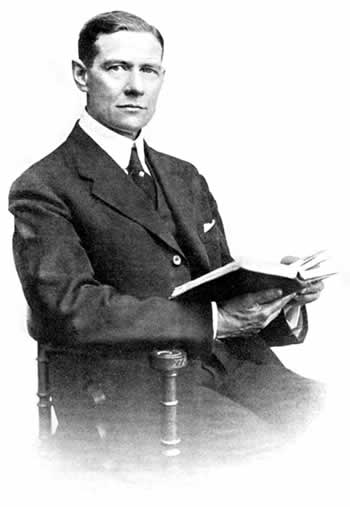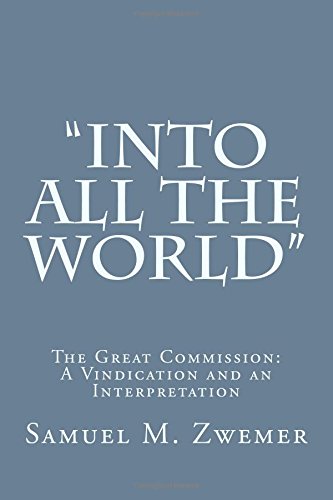Description
“INTO ALL THE WORLD”
The Great Commission:
A Vindication and an Interpretation
by
Samuel M. Zwemer
Professor Emeritus of The History of Religion and Christian Missions,
Princeton Theological Seminary
Copyright @ 1943
CHAPTER ONE THE MISSIONARY BACKGROUND OF THE OLD TESTAMENT AND THE FULLNESS OF TIME. 5
CHAPTER TWO THE FINALITY OF JESUS CHRIST. 17
CHAPTER THREE THE UNIVERSALITY OF JESUS. 34
CHAPTER FOUR THE AUTHENTICITY AND GENUINENESS OF THE GREAT COMMISSION 47
CHAPTER FIVE THE LAST TWELVE VERSES OF THE GOSPEL OF MARK 57
CHAPTER SIX THE FIVEFOLD COMMISSION. 72
CHAPTER SEVEN BEGINNING AT JERUSALEM.. 81
CHAPTER EIGHT ISRAEL IN GOD’S PROGRAM.. 90
CHAPTER NINE THE APOSTOLIC AIM AND GOAL. 110
CHAPTER TEN APOSTOLIC METHODS. 122
CHAPTER ELEVEN THE APOSTOLIC DYNAMIC. 134
CHAPTER TWELVE APOSTOLIC QUALIFICATIONS. 144
CHAPTER THIRTEEN THE APOSTOLIC MESSAGE. 155
CHAPTER FOURTEEN WHAT CONSTITUTES A CALL. 165
FOREWORD
The International Missionary Council appointed Dr. H. Kraemer, of Leyden University, to prepare a volume for the Madras meeting (1938) on the evangelistic approach to the great non-Christian faiths, and to define the fundamental position of the Christian Church as a witness-bearing body in the modern world. He executed his difficult task with consummate skill, and as a result his book will remain for many years to come the classical treatment of missions from a Biblical standpoint.
The present critical situation calls for this very fundamental reorientation. “The tempest of contemporary history is forcing back the Christian Church to fundamentals, to such a radically religious conception of life as is revealed to us in the Bible.” In his epilogue to this remarkable volume, Kraemer writes: “The three main things that are needed are a deepening and vitalizing of the religious and theological background of missions and the Christian churches, a determined effort to build everywhere strong indigenous churches . . . and a genuine evangelistic or apostolic spirit.”
It is on these lines that we have tried to make our small contribution and call the reader back to the teaching of the apostles and their example.
An emasculated Christianity has no power of propaganda and no missionary passion. The present-day trend of theological thought, however, is away from yesterday’s naturalism and relativism. So we have tried in this little book, in some small degree, to weigh the overwhelming evidence for the genuineness of CHRIST’s Great Commission and for the finality of His teaching.
– Three chapters deal with the place of JESUS CHRIST in the Old and New Testaments;
– Five chapters with the Great Commission, its authority and its implications;
– While the remaining chapters six chapters tell of apostolic aims, methods, dynamic, qualifications, message and call.
As the critical days in which we live call for heroism in defence of both liberty and truth so the present opportunities and difficulties of the missionary enterprise challenge the youth of today. Paul has much to teach us, and in going back to him we go back to CHRIST.
Some of the chapters were given as lectures at the Missionary Training Institute, Nyack, N. Y., the Biblical Seminary in New York, and two of them at the Dallas Theological Seminary, Texas.
Chapter IV appeared in the Union Seminary Review (Richmond, Va., November, 1942). This and chapter V deal with the results of textual criticism, a field in which I am, like Browning’s Arab physician, Karshish, only “a picker-up of learning’s crumbs.” But like him one can be an accurate observer of what one does not fully understand. And the miracle of the resurrection of Lazarus was not too great for Karshish, “one not in-curious in GOD’s handiwork.” Neither is the miracle of the inspiration of the Gospel too great for those who believe in the Risen Saviour.
New York City
Samuel M. Zwemer
CHAPTER ONE THE MISSIONARY BACKGROUND OF THE OLD TESTAMENT AND THE FULLNESS OF TIME
“Now the Lord had said unto Abram, Get thee out of thy country, and from thy kindred, and from thy father’s house, unto a land that I will show thee: and I will make of thee a great nation, and I will bless thee, and make thy name great; and thou shalt be a blessing: and I will bless them that bless thee, and curse him that curseth thee: and in thee shall all families of the earth be blessed” (Genesis 12:1-3)
“His name shall endure for ever: his name shall be continued as long as the sun: and men shall be blessed in him: all nations shall call him blessed. Blessed be the Lord God, the God of Israel, who only doeth wondrous things. And blessed be his glorious name for ever: and let the whole earth be filled with his glory; Amen, and Amen” (Psalm 72:17-19)
The Great Commission which JESUS CHRIST gave to His apostles was latent in the promises and prophecies regarding the Messiah found in the Old Testament.
So Dr. George Smith in his Short History of Missions devotes an entire chapter to the Old Testament preparation and begins the history of missions with the call of Abraham.
He was the father of all believers, the first exile from home in whom all the families of the earth were to be blessed.
Where now, at the junction of Ur on the Iraq State Railway, passengers from Baghdad stop for breakfast, “the God of Glory appeared to Abraham and gave the first missionary call.”
“It has,” writes Dr. Smith, “been often repeated since to prophet and apostle by the Angel of the covenant, by the Lord of glory in the flesh, by the Lord in glory especially to Paul – repeated not less really though in the still small voice, in dream and vision, or in startling providence, to the modern missionary. The call has been always the same, to get out from home, to come to the land of GOD’s choosing, to go to the people who cry for help, to leave kindred and all things for My sake and the Gospel’s.”
By Abraham’s obedience, Palestine became the greatest missionary center of the race, the land chosen by GOD’s providence to be the cradle of Old Testament prophecy, the Messiah’s birthplace and the focus of apostolic missions. Abraham was not only the heir of GOD’s promise for world-wide salvation, but he was the recipient of a covenant of grace.
The Gospel was before preached to Abraham (Galatians 8:8).
GOD gave Himself to him, as He had never done to man before, in a covenant, made not with the race, as in Noah’s time, to save the bodies of men, but with the spiritual father of all who should believe.
Next to the gift of His own Son, in the Incarnation and its message to the virgin mother and the watching shepherds, there is no such example of GOD’s grace to sinful man as the first of all covenants, the conditioned pledge to Abraham, and through him to the whole race.
“From sundown on one day to dark night on the next, the first missionary, in the prime of life, sat in watchful meditation or lay in wrapt vision (Genesis 15) beside the five sacrificial animals which he had divided, so that GOD might visibly pass between them. Against the midnight horror of great darkness, Abraham saw GOD as a pillar of fire enwrapped in smoke, ratifying the covenant. It was Abraham’s Gethsemane, a type of the age-long suffering of Israel. Abraham believed in GOD and saw CHRIST’s day. One may even say that it is the fulfilling of that covenant, apparently now slow, now by leaps, but always according to what has been called GOD’s leisure and GOD’s haste, which constitutes the History of Missions” (George Smith).
The promise of the Messiah is the golden thread of universalism in the story of Israel as recorded in the Old Testament.
The earliest reference is “to the seed of the woman” (Genesis 8:15), often called the proto- evangelium.
Then the promise was that the coming Deliverer would belong to the Semitic race (Genesis 9:2627).
Afterwards GOD appeared unto Abraham (Genesis 12) and gave him the promise:
“I will bless thee, and make thy name great; and thou shalt be a blessing . . . and in thee shall all families of the earth be blessed.”
This promise was reiterated and made more definite to Isaac and to Jacob. Then on his deathbed Jacob singled out Judah in his prophetic blessing as the ancestor of the coming Deliverer:
“The sceptre shall not depart from Judah, nor a lawgiver from between his feet, until Shiloh [the Rest-Giver] come; and unto him shall the gathering of the people be” (Genesis 49:10).
Later we have the remarkable prophecy of Balaam (Numbers 24:17) when he fell into a trance and saw a vision of the Almighty:
“I shall see him, but not now: I shall behold him, but not nigh: there shall come a Star out of Jacob, and a Sceptre shall rise out of Israel, and shall smite the corners of Moab, and destroy all the children of Seth . . . out of Jacob shall come he that shall have dominion.”
Like a pyramid these prophecies rise from a wide base and become more definite, distinct and glorious as they are built higher and higher by the later prophets, Isaiah, Jeremiah and Daniel. In these great visions the coming of the Redeemer is to be a conflict with evil until He is victorious and returns upon the clouds of heaven to triumph over the Antichrist.
The new Jerusalem is to surpass the glory of the Tabernacle, with its Shekinah, and the Temple. Its gates, open to all nations, are for salvation and praise. The Gentiles are to bring their glory and honor as tribute to the Messiah King.
“He shall have dominion also from sea to sea, and from the river unto the ends of the earth” (Psalm 72).
The King comes for judgment as well as for salvation. The great judgment will be a battle, a harvest and a treading of the wine press (Zephaniah 1:14-18; 3:1-3). The great and terrible day of the Lord (Malachi) is also a day of redemption and the outpouring of GOD’s Spirit (Joel). Israel will rise from the dead and her dry bones live (Ezekiel).
The Messiah will come as Prophet (Moses) Priest (Ezekiel) and King (Isaiah).
He will reign on the throne of David in righteousness forever. A twig from the stump of Jesse will fill the whole earth with its fruitfulness (Isaiah). A Ruler will be born in Bethlehem. He will fulfill all the ancient promises and rule all the ends of the earth (Micah 5:1-4).
While the earliest prophets, for example, Elijah, Joel and Amos, are silent regarding a universal kingdom of GOD, the later wax eloquent in their fullness of Messianic message. So also we find a strong note of missions in the Psalms, especially in Psalms 2, 45, 67, 72, 100 and 110. These Psalms became the basis of the later missionary hymnology of all Christendom.
The Old Testament also teaches the unity and solidarity of the race by creation, and by GOD’s providence over the nations.
One has only to read the earlier chapters of Genesis, the laws of Moses regarding strangers and aliens, or the prayer of Solomon at the dedication of the Temple to find illustration of this remarkable fact. It is also the chief lesson of the book of Jonah. The Jewish theocracy is the background for Old Testament universalism.
The Messiah promised is to be the desire of all nations (Haggai 2:6-9).
Adolf Harnack in his great work on The Mission and Expansion of Christianity in the First Three Centuries points out that the diffusion of Jewish monotheism and ethics throughout the whole known world by Israel’s wide dispersion was a most important factor in apostolic missions.
There were Jews in all the Roman provinces.
In Egypt they numbered nearly a million. The total number of Jews in the first century is put at over four million! “It is utterly impossible to explain the large total of Jews in the Diaspora by the mere fact of the fertility of Jewish families. We must assume, I imagine, that a very large number of pagans and in particular of kindred Semites of the lower class, trooped over to the religion of Yahweh.”[i]
This missionary zeal, to which both CHRIST (Matthew 23:15) and Paul (Romans 10:2) refer, was one reason why the rejection of Israel meant salvation for the Gentiles. They carried the Old Testament Scriptures in the Septuagint translation to the remotest parts of the Greek-Roman world.
“The Jews,” says Renan, “had a patriotism of extraordinary warmth but not attached to anyone locality, a patriotism of traders who wandered up and down the world and everywhere hailed each other as brethren, a patriotism which aimed at forming not great compact states but small autonomous communities under the aegis of other states.”[ii]
It was from these “cells” of Abraham’s race and their worship that the field was tilled all over the empire for the sowing of the Gospel.
- There were synagogues in every town – which the apostles and evangelists used as pulpits.
- There was a widespread knowledge of the Old Testament.
- The very presence of the Jewish community was an impressive apologetic on behalf of monotheism and ethics.
In short, the spread of Judaism anticipated and prepared the way for that of Christianity. This was one important element in what the Apostle Paul calls “the fulness of time.”
“When the fulness (pleroma) of the time was come, God sent forth his Son, made of a woman, made under the law, to redeem them that were under the law, that we might receive the adoption of sons” (Galatians 4:4-5).
This expression “the fulness of time” is used only twice in the New Testament. It occurs a second time, and is used by Paul, in Ephesians 1:10, “the dispensation of the fulness of time.”
The Greek word signifies either that a period of time which was to elapse has passed or that a definite time is at hand (Mark 1:15; Luke 21:24). It includes the ideas of completeness in quantity and quality (I Corinthians 10:26).
- The ripeness of harvest in nature;
- the end of a cycle;
- the completion of a biological process;
- the termination of a period of preparation;
- the beginning of a crisis
- all these ideas are latent in this pregnant word.
The fullness of time for the Incarnation and the preaching of the Gospel came in the year 749 of the foundation of Rome when the decree went out from Caesar Augustus that all the empire should be enrolled (Luke 2:1). The fullness of time was characterized by economic, political and social changes “apparently to allow of a free, uninterrupted and universal propagation of the liberated truth; to summon to its obedience every nation, every class, every character; to purge, to chasten, to restore the whole of the fallen race of man” (Gladstone, quoted in John Morley, Life of Gladstone, Vol. I, p. 81).
The fullness of time was one of preparation and expectation and of disillusionment and despair.
Languages, highways and communications were prepared. There was expectation of a coming Deliverer among Jews and Gentiles. There was a turning away from old faiths and superstitions and an eager outreach to the unknown GOD.
The four hundred years between Malachi and Matthew are not adequately represented in our Bibles by the blank page that divides the Old Testament from the New Testament. On that page we must inscribe the fullness of preparation, the fullness of expectation and the fullness of despair before the coming of the Redeemer.
On that page we must write the names of four great cities that rose to power and influence in GOD’s eternal purpose for the spread of His Gospel:
- Rome,
- Alexandria,
- Antioch and
As Edersheim remarks:
“The reign of Augustus marked not only the climax but the crisis of Roman history. Whatever of good or evil the ancient world contained had become fully ripe. As regards politics, philosophy, religion and society the utmost limits had been reached. Beyond them lay as the only alternatives, ruin or regeneration.”
Stoicism and Epicureanism had both done their best and their worst. There were three sad and pitiful signs of the times – the treatment of slaves, the callous attitude of the luxurious rich toward the poor, and the public amusements in the arena of cruelty.
Five great historic figures were raised up of GOD as harbingers of a new era and, in a sense, preparatory leaders for the coming of the King of Righteousness and the Prince of Peace.
Socrates was a contemporary of Malachi. The former died in 399 B.C. and the two lives overlap. The last great spiritual teacher of Israel was succeeded by the first great spiritual teacher of the classic world. There had been many philosophers before Socrates but their teaching landed men in the Slough of Despond. This philosopher had firm footing on the road to monotheism, taught the dignity of manhood, and was assured of the immortality of the soul. He prepared the way for Plato and Paul.
Alexander the Great was a pupil of Aristotle and so became more Greek than Macedonian. He carried Greek literature and culture to the bounds of Persia and India until all the Near East was Hellenized. The Jews of Alexandria translated their sacred books into Greek and so, by means of the Septuagint, the doors for the proclamation of the Gospel were opened to all Greek-speaking Jews who mediated the message; as we see in the case of Philip, Stephen and Barnabas. Alexander the Great prepared the way by his wide conquests and the spread of Greek culture for CHRIST’s messengers throughout Asia Minor.
Judas Maccabeus broke the foreign yoke from the neck of the Jews in Palestine and, one hundred and fifty years before CHRIST was born, kindled the flame of patriotism and freedom. The Jews were to be consolidated, unified, given a better hope and inspired with faith for their future deliverance. The prime agent in this work was Judas Maccabeus. For over a century the Jews paid tribute to no foreign master. Their leader died in 160 B.C. but his soul went marching on. Israel waited for a King.
Julius Caesar’s name and greatness are familiar to all. More than all other Romans put together he made the world-empire what it was. He gave distinctive character to Roman citizenship, built roads across Europe, made travel safe and commerce international. Along Caesar’s great highways his legions marched to extend the empire, and the apostles went on their mission of peace. As Professor Breed remarks, “Julius Caesar made the ‘Acts of the Apostles’ possible.”
Herod the Great was great in cruelty and profligacy and yet he too had a place in GOD’s plan. Herod promoted the hope of Israel by rebuilding the Temple. Forty-six years, the Gospel tells us, he toiled to enrich and embellish Jerusalem, and gave it a sanctuary that rivaled Solomon’s Temple. When that building was completed, the Lord of the Temple came suddenly to the Temple of the Lord (Malachi 3:1).
Aged Simeon, holding the Babe of Bethlehem in his arms, cried:
“Now lettest thou thy servant depart in peace, according to thy word: for mine eyes have seen thy salvation, which thou hast prepared before the face of all people; a light to lighten the Gentiles, and the glory of thy people Israel.”
All things were ready. The Temple-gate Beautiful, and Solomon’s Porch, and the great Courtyard – what were they but Herod’s pulpits built for the Teacher sent from GOD who would abolish the sacrifices because He Himself was the Lamb of GOD that taketh away the sin of the world.
Three languages were prepared for the Word of GOD and for Pilate’s inscription on the Cross. In Hebrew, in Greek and in Latin the story of the Saviour-King would soon be heard on three continents – Europe, Asia, and Africa; in three worlds – the world of Roman law, of Greek civilization and of Jewish tradition.
Harnack puts first among the factors that ushered in “the fulness of the time,” the Dispersion of the Jews. This was GOD’s providential preparation. Here was a wide field partly tilled in every great city; a preliminary knowledge of the Old Testament promises; the habit of public worship of one true GOD and superior ethical standards in contrast with Roman-Greek paganism; and last, but not least, an innate urge to win proselytes – the zeal of Zion.
The Jews were interracial merchants and traveled everywhere. One in Phrygia is mentioned who made the voyage to Rome seventy-two times in the course of his life. In short, we may sum up these preparatory events in the words of the great Church historian Harnack:
“The narrow world had become a wide world, the rent world had become a unity, the barbarian world had become Greek and Roman; one empire, one universal language and one civilization; a common development toward monotheism and a common yearning for Saviours.”
There was also a fullness of expectation among Jew and Gentile for the coming of a Redeemer.
The third book of the Sibylline Oracles (which for the most part dates from the first century before CHRIST) presents a picture of Messianic times which is generally admitted to have formed the basis of Virgil’s remarkable description in his Fourth Eclogue of a coming Golden Age, under a Messiah-child sent by the gods.
The following portion of this Fourth Eclogue is from the rendering by John Dryden and reminds us of the Spanish saying, “The eyes of Virgil were the first to see the Star of Bethlehem”:
The Father banished virtue shall restore,
And crimes shall threat the guilty World no more,
The Son shall lead the life of Gods, and be
By Gods and Heroes seen, and Gods and Heroes see.
The jarring Nations he in peace shall bind,
And with paternal virtues rule Mankind.
Unbidden, Earth shall wreathing ivy bring
And fragrant Herbs (the promises of Spring)
As her first offerings to her infant King.
An even more remarkable indication of this longing for a world-mediator, one who could restore peace and righteousness, is found in Plato.
He almost echoes the prophecy of Isaiah regarding the Servant of Jehovah who would suffer for the transgressions of His people and by whose stripes we are healed (Isaiah 53).
Here are the astonishing words:
“The perfectly righteous man, who without doing any wrong may assume the appearance of the grossest injustice; yea, who shall be scourged, fettered, tortured, deprived of his eyesight, and after having endured all possible sufferings, fastened to a post, must restore again the beginning and prototype of righteousness” (Politia 4:74).
It is immaterial to ask where Plato obtained his idea of a just man suffering for the unjust. The idea is there and gave rise to the hope for a Redeemer.
Waiting disciples in Jewry also were looking for the Consolation of Israel; Simeon, Anna and Zacharias are only three out of many, whose names are not recorded by Luke. The pious Jew and the Greek Proselytes of the Gate (like the Ethiopian eunuch) read the prophecies of Isaiah and other promises of a Golden Age yet to be.
Then, in the fullness of time, to those who were waiting and expecting, like Anna, Zacharias and aged Simeon and many more, the Sun of Righteousness arose with healing in His wings. In the power of Elijah the prophet, John the Baptist came as herald of the King to “turn the heart of the fathers to the children, and the heart of the children to their fathers” (Malachi 4:6).
Daniel’s dream and vision must have been of great comfort to the generations just before CHRIST came, an age of confusion and ruthless conquest when men’s hearts failed them for fear.
“In the days of those kings shall the God of heaven set up a kingdom, which shall never be destroyed: and the kingdom shall not be left to other people; but it shall break in pieces and consume all these kingdoms and it shall stand for ever” (Daniel 2:44).
This was the ideal kingdom of which David told in the Psalms. It was the coming of the Messiah who would “judge the people with righteousness, and the poor with justice.”
He would break in pieces the oppressor. His Name would endure forever and all nations would call Him blessed. Even as GOD promised to Abraham at the first, so would He fulfill it all in the fullness of time. That time had come.[iii]
[i] Harnack’s Million and Expansion of Christianity, Vol. I, p. 8. 2
[ii] Les Apootres, Chapter XVI.
[iii] Cf. Zwemer, The Glory of the Manger, Chapter II.







Reviews
There are no reviews yet.